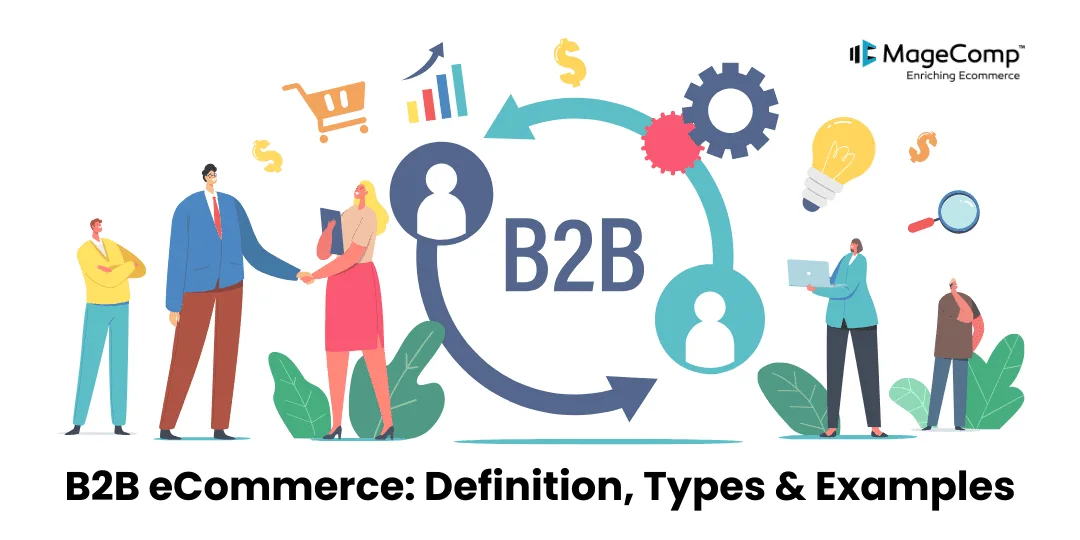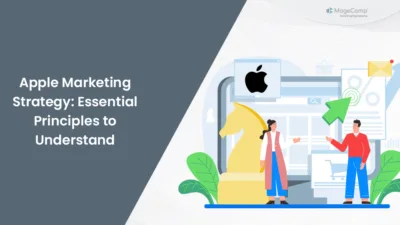The majority of people think that running a business is all about selling the commodities to the end users only. For them, B2C is the only business model that exists in today’s eCommerce market. But an eCommerce market is so much more than we think it is. There are multiple types of eCommerce businesses in existence that we utilize directly or indirectly every day.
In this article, we will learn about one of the most popular eCommerce types, the B2B business, which stands for business-to-business eCommerce business. As time has passed by, the B2B business model businesses have increased a lot. This informative blog will take you deep into understanding what B2B businesses exactly are.
What Does B2B Businesses Mean?
B2B business is the short form of business-to-business eCommerce business model. This is a type of business that transacts with businesses only, i.e., a manufacturer directly trading the manufactured goods directly to a wholesaler or a retailer. Similarly, a B2B eCommerce business is a business that sells commodities to wholesalers and retailers via an online website, online market place digital channels.
Today’s B2B business market has been growing rapidly, along with revolutionizing the ways how businesses connect with their customers. The B2B business not only streamlines the selling process but also reduces the overhead costs and automates the tasks that previously needed a sales representative. Additionally, a B2B business also provides access to a broad range of potential suppliers and customers, no matter what their location is.
The B2B business model has become so popular that experts estimate that the net worth of the B2B business’s digital market will reach $20.9 trillion by the year 2027. This data appropriately indicates the increasing popularity of B2B businesses.
Types of B2B eCommerce Models
1. B2B2C
B2B2C, or Business-to-Business-to-Consumer, is a business model where a company sells its products or services to other businesses (B2B) with the ultimate goal of reaching end consumers (C). In this model, the intermediary businesses act as conduits, facilitating the distribution of goods or services to the final consumer.
For example, a manufacturer of electronic components may sell its products to a retailer, which then sells those components to consumers. The B2B2C model often involves collaboration and partnership between businesses at different stages of the supply chain to provide a seamless customer experience.
This model offers several advantages, including expanded market reach, enhanced brand visibility, and increased sales opportunities. However, it also requires effective communication, coordination, and trust among all parties involved to ensure the delivery of high-quality products and services to end consumers.
2. Wholesalers
Wholesale eCommerce business model is a business that sells commodities in bulk to retailers or resellers. Wholesalers are intermediaries in the supply chain who purchase goods in bulk from manufacturers and sell them to retailers in smaller quantities. They serve as a link between producers and retailers, facilitating the distribution of goods efficiently and cost-effectively.
Wholesalers often negotiate lower prices due to their large purchase volumes, enabling retailers to access products at competitive rates. They provide essential services such as warehousing, inventory management, and logistics, streamlining the distribution process for retailers. By consolidating products from multiple manufacturers, wholesalers offer retailers a diverse range of goods, reducing the need for retailers to deal directly with numerous suppliers.
3. Suppliers/Distributors
Distributors are the ones that fulfills the supply to a good’s demand in the market. Distributors play a crucial role in the supply chain by acting as intermediaries between manufacturers and retailers. They purchase goods in bulk from manufacturers and then distribute them to retailers for sale to consumers.
Distributors work closely with manufacturers to increase their brand visibility in the market and gain more manufacturer clients. They also provide value-added services such as packaging, marketing support, and inventory management.
By streamlining the distribution process, distributors help manufacturers expand their reach and access new markets while enabling retailers to access a wide range of products without dealing directly with multiple suppliers.
4. Manufacturers
A manufacturer is a company or entity that produces goods or products on a large scale, typically using machinery, labor, and raw materials. Manufacturers play a crucial role in the supply chain by transforming raw materials or components into finished products ready for distribution and sale. They often engage in processes such as assembly, fabrication, or processing to create a wide range of goods across various industries.
Manufacturers are responsible for maintaining quality standards, optimizing production efficiency, and meeting consumer demand. Their products contribute to the economy and consumer markets, driving innovation, employment, and economic growth.
5. SaaS
SaaS stands for Software as a Service that delivers software applications over the internet eliminating the need for users to download, install, or maintain the software locally. Instead, users access the application via a web browser or API, typically on a subscription basis.
SaaS providers host and manage the infrastructure, including servers, databases, and code, allowing users to focus on using the software rather than managing it. This model offers scalability, flexibility, and cost-effectiveness, as users can easily scale their usage up or down based on their needs. Popular examples of SaaS include Google Workspace, Microsoft 365, and Salesforce.
Examples of B2B eCommerce Businesses
1. Amazon Business
Amazon is the best example of B2B2C business that targets both B2B businesses and the end users themselves. This amazing platform allows businesses and customers to buy products at discounted prices along with offering additional benefits business-only products, free shipping and exclusive pricing.
2. Alibaba
Talking about B2b business and not considering Alibaba? Not posible at all. Alibaba is a leading B2B eCommerce platform connecting businesses worldwide. It offers a vast online marketplace where suppliers can showcase their products to buyers, facilitating wholesale transactions on a global scale. With extensive product categories and robust trade services, Alibaba revolutionizes business-to-business commerce by streamlining transactions and fostering international trade relationships.
3. McKesson
McKesson operates as a B2B eCommerce business, providing pharmaceuticals, medical supplies, and healthcare solutions to hospitals, pharmacies, and healthcare facilities. Through its online platform, it facilitates seamless transactions between suppliers and healthcare providers, offering a wide range of products and services essential for patient care and operational efficiency.
4. Google Cloud
Google Cloud offers scalable infrastructure and advanced analytics tools for B2B eCommerce businesses. It provides secure, reliable, and flexible solutions for hosting eCommerce platforms, managing customer data, and optimizing operations. With features like AI-driven insights and global network capabilities, Google Cloud empowers B2B eCommerce businesses to drive growth, efficiency, and innovation.
5. Facebook for Business (Facebook Marketplace)
Facebook for B2B eCommerce businesses offers targeted advertising to reach decision-makers, industry professionals, and businesses. It facilitates brand awareness, lead generation, and networking through business pages, groups, and Messenger. Utilize analytics for insights, share valuable content, and engage in meaningful interactions to drive conversions and foster B2B relationships effectively.
Recap
B2B eCommerce plays a pivotal role in the modern business landscape, facilitating transactions between businesses through online platforms. By understanding the definition, types, and examples of B2B eCommerce, businesses can leverage this powerful tool to streamline operations, expand market reach, and drive growth.
Whether it’s through traditional wholesale platforms, online marketplaces, or specialized B2B eCommerce portals, the opportunities for businesses to connect, collaborate, and transact in the digital realm are vast. As technology continues to evolve and consumer behaviors shift, embracing B2B eCommerce is not just a choice but a necessity for businesses looking to stay competitive and thrive in today’s dynamic marketplace.
If you have any B2B business idea on your mind and want to launch your own B2B website, contact us and get fully functional website ready for your B2B business.
Thank you for reading!





